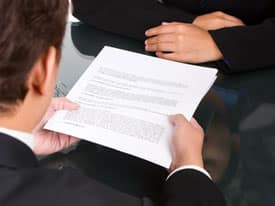 Nonfiction book proposal – what is it and how do you write one? A non-fiction book proposal is necessary for most nonfiction authors hoping to be represented by a literary agency and/or get a deal with a publishing house. This article explains everything you need to know to write an irresistible nonfiction proposal. It’s part of a 17-part article series called Get a Literary Agent and Get Published.
Nonfiction book proposal – what is it and how do you write one? A non-fiction book proposal is necessary for most nonfiction authors hoping to be represented by a literary agency and/or get a deal with a publishing house. This article explains everything you need to know to write an irresistible nonfiction proposal. It’s part of a 17-part article series called Get a Literary Agent and Get Published.
Writing a nonfiction book proposal will also help you get clearer about the uniqueness and value of your book. Your nonfiction book proposal will essentially be a much longer version of a query letter for literary agents (you might find it helpful to think of your query letter as an “Executive Summary” of your nonfiction book proposal).
* * *
Nonfiction Book Proposal – Sections
Your nonfiction book proposal should be divided into the following four sections, and they should be arranged in the following order.
* * *
The Four Parts of a Nonfiction Book Proposal
* * *
Part 1 – Nonfiction Book Proposal
About the Book

This section of a nonfiction book proposal includes information about your book and your target market. This is where you’ll answer questions like:
- What is the title/subtitle?
- What is your book (or book idea) about?
- What genre or category do you believe your book best fits into?
- What is the target market (who do you think is the ideal person to enjoy and/or benefit from your book)?
- How many words is the manuscript or what is the expected word count?
- How much of your book is completed?
- What is the story or inspiration behind your book?
- What is your book’s history (has it been self-published, previously represented by another book agent, or reviewed by any publishers, etc.)?
- Do you have other books available, or ideas for other books?
* * *
Part 2 – Nonfiction Book Proposal
Competitive Advantages
Most book agents call this section of a nonfiction book proposal the “Competition” section, but I prefer to call is the “Competitive Advantages” section. That reinforces the idea (in your mind and in the mind of publishing agents) that your book is different (and in some ways better) than “similar” titles in your genre.

Here you’ll answer questions like:
- Although your book is certainly unique, what competing or “similar” titles can you compare it to… to help others understand what it’s like (or not like)? How is your book similar? How is your book different?
- Why do you believe that your book has publishing potential (and, perhaps, bestseller or high commercial potential?
- What unique content do you have in your book (e.g. special knowledge or research, life experience, stories, a unique system or process, etc.)?
- Do you believe that you have a unique writing style (e.g. structure, format, voice, etc.)?
* * *
Part 3 – Nonfiction Book Proposal
Biography
This section of a nonfiction book proposal provides detailed information about you (relevant to your book), that communicates your credibility as an author.
Don’t be shy, you’ve got to do it.

For example:
- Provide a 50-250 word bio.
- What other writing have you done in the past (e.g. journals, letters, stories, articles, blogs, column, speeches, workshops, seminars, training curriculums, books, etc.), and… how much?
- Have you published any of your writing?
- List any of the following things that might be relevant: education; professional accomplishments; volunteer, community, and business affiliations; honors, awards, and prizes; associations, professional groups and/or other organizations that you’re part of; avocations, hobbies, and/or enthusiasms.
- Have you attended any writers’ groups, retreats, seminars, workshops, or conferences… or, have you ever worked with a professional book coach, consultant, or editor?
* * *
Part 4 – Nonfiction Book Proposal
Marketing & Publicity
This section of a nonfiction book proposal details your ability and/or plan to promote your book prior to publication, and after publication.

For example:
- Do you have a website and/or blog?
- Are you active on social media (if so, how many friends/followers do you have)?
- What is the size of your current email list (if you have one)?
- What is the size of your current phone/fax contact list (if you have one)?
- What is the size of your current physical address mailing list (if you have one)?
- Do you have any formal lecture, seminar, and/or workshop experience?
- Do you have any publicity or public relations experience?
- Do you have an existing business that will help promote your book?
- Do you have any reviews, blurbs, or testimonials for your book?
- Do you have a list of people that you believe might give you testimonials, or otherwise help you promote your book?
* * *
Conclusion – Nonfiction Book Proposal
Most authors don’t realize this, but you’ll need to write a nonfiction book proposal even if your book is already complete. Remember, a nonfiction book proposal does much more than simply explain what your book is about.
A nonfiction book proposal introduces book agents and publishers to you personally, through your Biography section. The Competitive Advantages section demonstrates the value and uniqueness of your book within a competitive marketplace. And the Marketing & Publicity section reveals what you’re willing and able to do, to help sell books.

Now, click here to read the next article in this 17-part series and
learn how to Submit Your Book to a Literary Agent.
* * *
* * *



Join Us